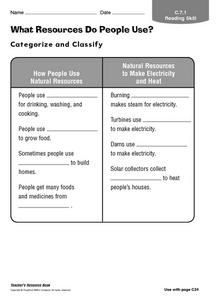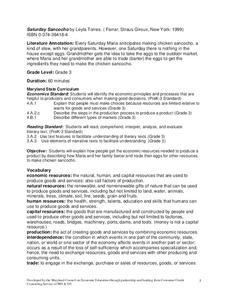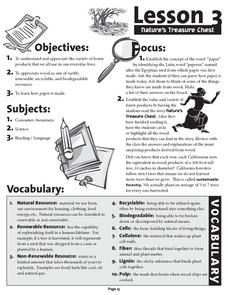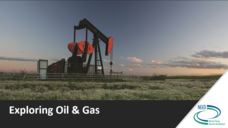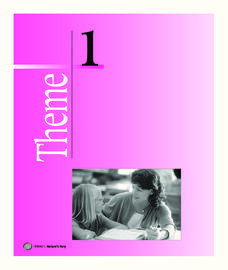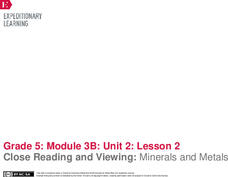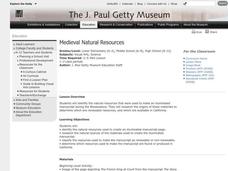EngageNY
Mid-Unit Assessment: Text-Dependent and Short Answer Questions: Excerpts from “A Limited Supply”
There's no such thing as an unlimited resource. Scholars complete a mid-unit assessment by reading A Limited
Supply. They answer text-dependent questions and complete a graphic organizer about key terms in the text.
Curated OER
Salt of the Earth: A Caddo Industry in Arkansas
Middle schoolers explore the history of the Caddo Salt Industry found in Arkansas. Along with learning about how salt deposits formed in Arkansas, learners study the process of salt production and how valuable salt is as a natural...
Fluence Learning
Writing About Literature: Nature in the Writings of John Muir and Emily Dickinson
As an assessment of their skill in crafting a compare and contrast essay, class members read and compare the portrayals of nature in excerpts from naturalist John Muir's My First Summer in the Sierra and from poet Emily Dickinson's "The...
Curated OER
Water Resources and the Role of the Independent Sector
Students identify the need to maintain and protect our natural resources. In this natural resource instructional activity, students study pictures of the effects of pollution on animals and water. Students brainstorm a list of ways water...
Curated OER
What Resources Do People Use?
In this resources worksheet, students will fill in the missing word in 4 statements referring to how people use natural resources. Then students will fill in the missing word in 4 statements about how natural resources are used to make...
Curated OER
Saturday Sancocho
Second graders identify the economic principles and processes that are helpful to producers and consumers when making good decisions. Students will read, comprehend, interpret, analyze, and evaluate literary text as well as explain how...
Curated OER
THE LORAX
Students examine Dr. Suess's story, The Lorax, and the concept of needless waste in a "natural" environment, and study how this story relates to the real world. They discuss what recycling means and what happens when something is not...
Houghton Mifflin Harcourt
Nature: Friend and Foe: Challenge Activities (Theme 6)
The teacher doesn't always have to be the expert in the classroom. The first in a series of three supplementary activities Nature: Friend or Foe uses hands-on research tasks and projects to enhance readers' understanding of non-fiction...
Forest Foundation
Nature's Treasure Chest
Renewable, recyclable, and biodegradable. As part of their study of the forest ecosystem, class members read "Nature's Treasure Chest" about the many products made from trees and then craft their own recycled paper.
Baylor College
Fossil Fuels and the Carbon Cycle
Humans are quickly depleting Earth's fossil fuels and locating them is becoming increasingly difficult! Layered muffins are used for models as young geologists take core samples in order to determine the presence of oil. Consider first...
Curated OER
Natural Resources
In this environment worksheet, students are given information and write an environmental story. The information includes the making and reading of a map.
Curated OER
Natural Resources
In this natural resources worksheet, students compare and contrast renewable and nonrenewable resources. This worksheet has 1 fill in the blank and 9 short answer questions.
K12 Reader
Location, Location, Location
Why do some places in the world have more people living there than other places? Learn about the ways the countries have formed around natural resources with a reading comprehension activity. After kids read a short passage, they answer...
Chicago Botanic Garden
Greenhouse Gas Emissions — Natural and Human Causes
What impact do humans have on greenhouse gas emissions? What are the natural causes of these gasses? Thanks to the carbon cycle, carbon dioxide eats away at the earth's atmosphere with the intensified help of humans. Young scientists...
National Energy Education Development Project
Exploring Oil and Gas
The United States consumes more oil than any other country, about 1.85 billion barrels (or 77 billion gallons) a day. Viewers learn about the history of fossil fuel exploration and how they are formed in an informative presentation. They...
EngageNY
End of Unit Assessment, Part 2: Research and Response
Talk it out. Scholars complete part two of the assessment by participating in a World Café discussion activity. Learners circulate the room, sharing their ideas and thoughts about Canada's natural resources using quotes and paraphrasing...
Houghton Mifflin Harcourt
Nature’s Fury: Extra Support Lessons (Theme 1)
Earthquakes, hurricanes, volcano eruptions, and more. To enrich their study of nature's big events, kids map tectonic plates and major earthquake locations, identify emergency response agencies, and storyboard a film about volcanos.
EngageNY
Close Reading and Viewing: Minerals and Metals
How easy is it to live off the land? Scholars read Minerals and Metals in Your Life and discuss how Canada's natural resources meet the needs of the people. Pupils watch a brief video and discuss the gist of the text and video. They then...
Purdue University
Benefits of Connecting with Nature
Feel the healing effects of nature. Individuals learn about the benefits of nature using imagery. They begin by defining words to express how they feel emotionally and then practice using those words with hands-on activities. Once they...
Curated OER
Trade in Atlantic Canada
Middle schoolers explore the Atlantic region of Canada's natural resources and look into how these resources impact the lives of Atlantic Canadians. They perform Internet research, view images by the artist Robert Harris, and create a...
Curated OER
The Geography & Peoples of Europe
Extremely throrough and informative, this presentation details many aspects of European geography and demographics, including natural resources, climate, topography, and population distribution. This slideshow would be an excellent...
Curated OER
Medieval Natural Resources
Young scholars identify and research natural resources used in art. In this Renaissance art materials lesson, students look at examples of illuminated manuscripts and learn what materials were used to create the books. Then, young...
Curated OER
What We Can Do!
Learners examine how citizens protect natural resources. For this citizens and natural resources lesson, students listen to a reading of Our Planet: Earth. They discuss what natural resources are and why they need to be protected. They...
Curated OER
Design a Recycling Game!
Students discover that recycling is using a product more than once so that natural resources can be saved and so that we won't need so many garbage dumps and landfills. They see that there are different ways to recycle. Students design a...






